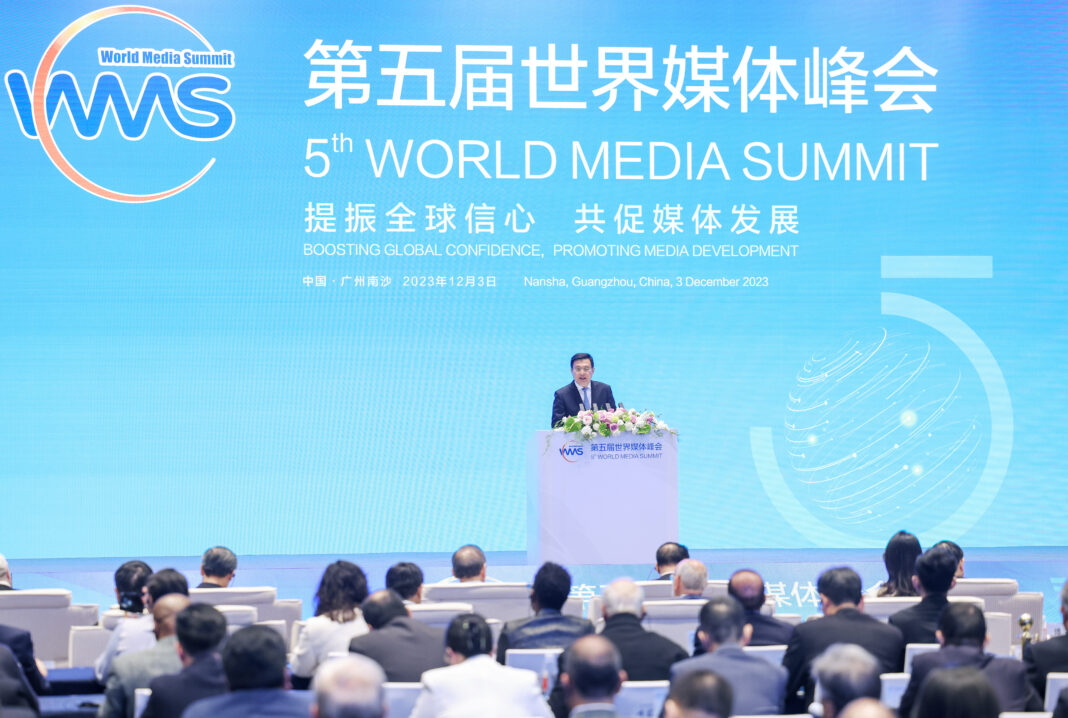By Roy Lie Atjam
The 5th World Media Summit (WMS) convened in Guangzhou, Guangdong Province, China from December 1st to 7th, 2023
The World Media Summit is a premium global media exchange and coordination platform. It was jointly launched in 2009 by a group of globally renowned media organisations, including Xinhua News Agency, the Associated Press and Reuters.
This year’s Summit focuses on “Boosting Global Confidence, Promoting Media Development.”
Representatives from 197 mainstream media outlets, government agencies, think tanks, diplomatic missions to China, and international organisations participated in the summit, along with government officials and heads of media outlets worldwide. The editor of Diplomat Magazine in The Hague, the Netherlands, also participated in this August gathering of top-level media outlets. In 2023, Diplomat Magazine proudly celebrates its 10th anniversary and culminates the year with outstanding participation in the 5th World Media Summit event.
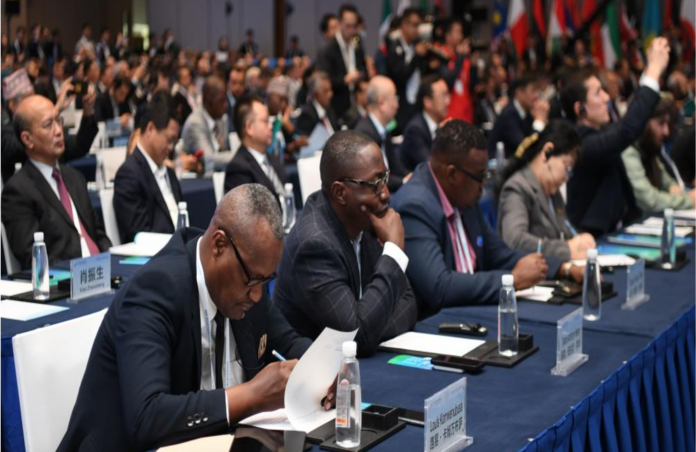
Xinhua News Agency President Mr Fu Hua Delivers Key-note Speech at 5th World Media Summit.
During the World Media Summit (WMS) opening ceremony, Mr Fu Hua, the president of Xinhua News Agency, delivered the keynote speech. Fu Hua emphasised the value of confidence, stating that it is more valuable than gold when facing difficulties. He believes that confidence is a keyword for global media leaders, as historical development, civilisation prosperity, and human progress require the media to foster unity and boost confidence.
The summit’s theme was “Boosting Global Confidence, Promoting Media Development.” Attendees discussed extensively how to contribute media power to construct a brighter future. Fu Hua noted that the WMS is essential for media communication and cooperation between countries. Therefore, efforts should be made to improve this multilateral mechanism and utilise it fully. This can be achieved by tapping into the potential for cooperation, innovating collaboration models, and expanding cooperation channels.
Mr Fu Hua also stated that Xinhua News Agency will enhance communication and consultation processes with media organisations from various countries. They will work together to construct and utilise the summit mechanism to promote media development and boost global confidence. In his discourse, he hopes that this initiative will help to build consensus and strengthen development trust, uphold objectivity and truth to enhance media’s credibility and deepen exchanges and collaboration to contribute to building an open, inclusive, clean and beautiful world that enjoys lasting peace, universal security and shared prosperity.
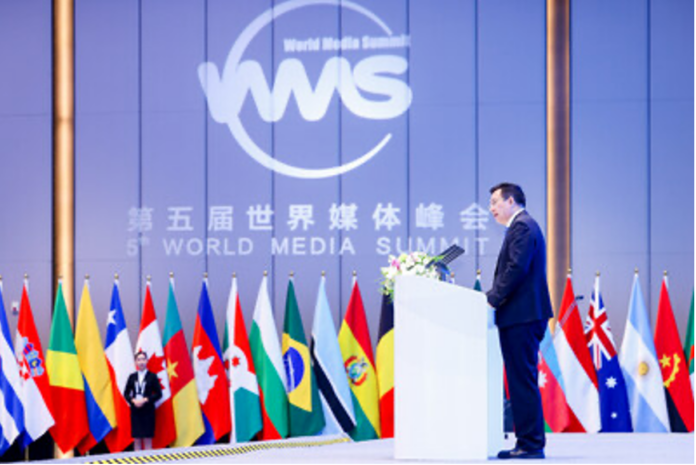
During the World Media Summit (WMS), Mr Hu Heping, the Executive Deputy Head of the CPC Central Committee Publicity Department, delivered a speech at the opening ceremony. He emphasised that the summit is an essential occasion for media professionals across the globe and the world media community.
Mr Hu Heping hopes that media outlets worldwide will uphold fairness and justice, fulfil their responsibilities, strengthen cultural exchanges, promote mutual learning among civilisations, deepen practical cooperation, and strive for mutual benefit and win-win results. He believes these efforts will contribute wisdom and strength to community building, leading to a shared future for all humanity. Mr Hu Heping remarked that the 5th WMS is a grand event for the global media circle and calls on media outlets to stay unbiased, promote mutual learning between civilisations, and deepen pragmatic cooperation to contribute their wisdom and strength to building a community with a shared future for humanity and building a better world.
Guangdong Governor Mr Wang Weizhong said in a speech that the World Media Summit is an essential platform for understanding China. Media outlets are welcome to visit Guangdong and the Guangdong-Hong Kong-Macao Greater Bay Area to witness and tell stories about China’s development.
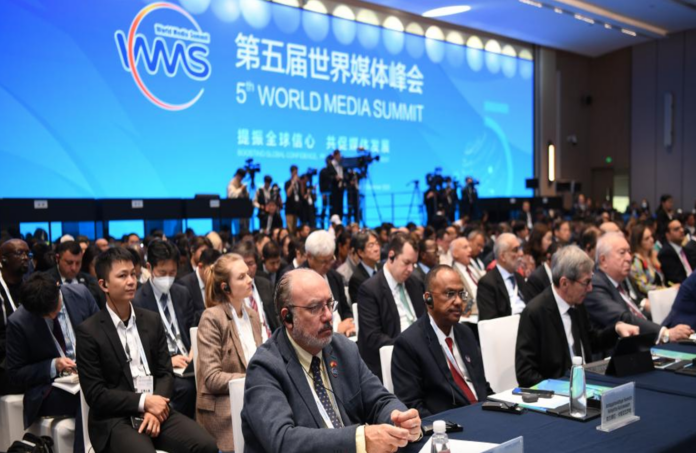
UN Undersecretary-General Melissa Fleming and other guests also delivered speeches at the ceremony. They agreed that as humanity faces many global challenges, we can only boost confidence and build a shared future by deepening communication and strengthening cooperation. A document titled “Joint Statement for the 5th World Media Summit“ was released at the opening ceremony and plenary session. During the summit, attendees discussed human development and security, new technological opportunities and challenges, media and market in the new era and other topics of common concern. They also visited several places in the provinces of Guangdong and Yunnan and holded exchanges.
The 5th World Media Summit, co-hosted by Xinhua News Agency and the Guangdong- and Yunnan provincial governments – December 2 to 8 2023 in Guangzhou and Kunming
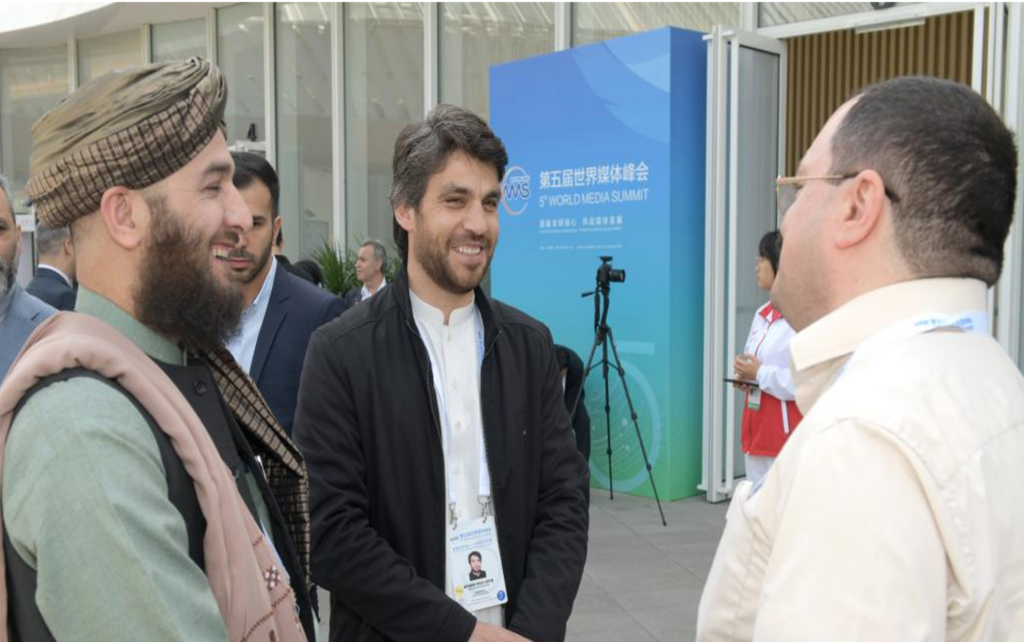
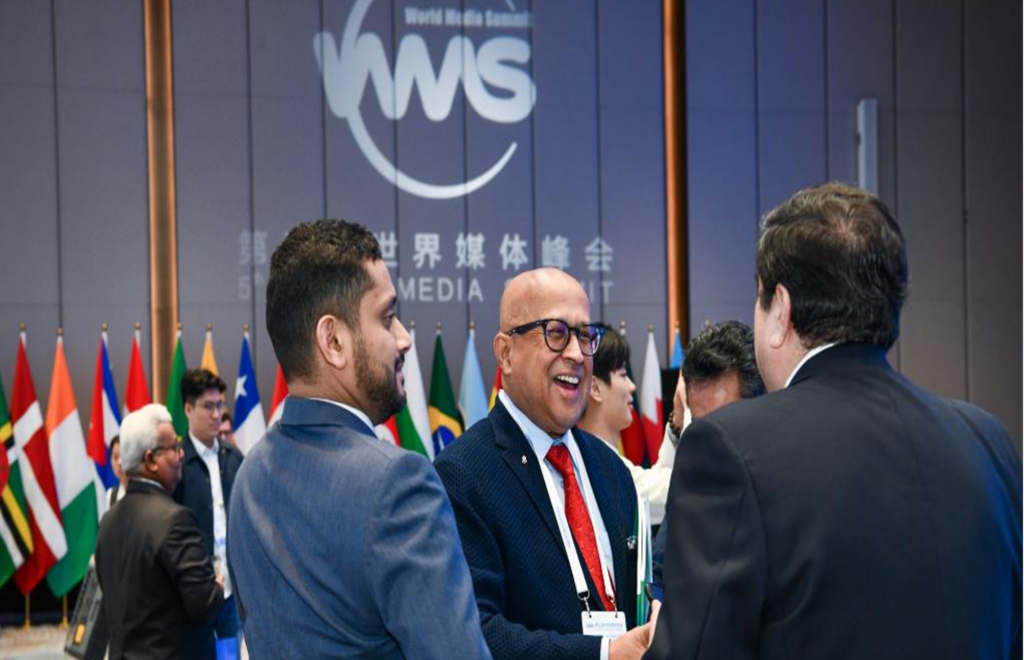

Addenda
An overview of participating media outlets in the 5th World Media Summit
- Associated Press
- AFP
- Teheran Times
- Jordan’s state-run Petra news agency.
- Prensa Latina News Agency
- News Ghana
- TASS
- Egypt State Information Service
- Philippine News Agency (PNA). PNA and Xinhua signed a news cooperation agreement in 1978, indicating a longstanding healthy relationship between the two sides.
- Iraqi Media Network
- ALJAZEERA MEDIA NETWORK
- Lebanon
- Reuters(Sue Brooks) values friendly relations with Xinhua News Agency and is willing to deepen exchanges with Xinhua in areas such as media application of new technologies and strengthen cooperation under the framework of the World Media Summit. The two organizations are both initiators of the World Media Summit and members of the summit’s preasidium.
- Barbados
- Telam, Argentina’s official news agency
- Qatar News Agency (QNA)
- TV BRICS, among others.

Testimonials and observations from attendees at the Xinhua Summit
The summit aims to stimulate refashioning the international media order in the 21st century. Xinhua News Agency suggests the current “international media order” is unfair, and we must “get all media from different countries and regions involved in news reporting in an equal way.” We need “comprehensive, objective and accurate news reporting,” but one goal of such coverage should be “eradicating the chasms, splits and gaps between different civilisations.”
“Media is very important, even more than we maybe can realise now. So, it is very important to spread the right and proper information, not misinformation,” said Igor Mekina, Director and editor in Chief Insajder.com, Slovenia.

When media discuss media and, news becomes the news
At the 5th World Media Summit, media professionals discussed various challenges and opportunities the industry faces. The veteran Indian journalist Mr Narasimhan Ram, Director of The Hindu Publishing Group (1878) made several noteworthy contributions to the WMS. “Professional journalism he says, which is based on fact-checking, accuracy, and integrity, will triumph over the rubbish information we see all around”. The industry faces many challenges, including the ongoing conflict between the Russian Federation and the Ukrainian Republic, as well as the Gaza conflict between the State of Israel and Hamas, which has created a deep divide across the globe.
Additionally, the current border dispute between the Bolivarian Republic of Venezuela and the Cooperative Republic of Guyana, particularly over the oil-rich Essequibo region, is another topic of concern. During the proceedings, various opinions were shared, including:
“To tweet or not to tweet has become the modern Shakespearean dilemma for individuals.”
“The main role of media in the new coming age is to verify information.”
“It’s amazing what technology can do and scary at the same time.”
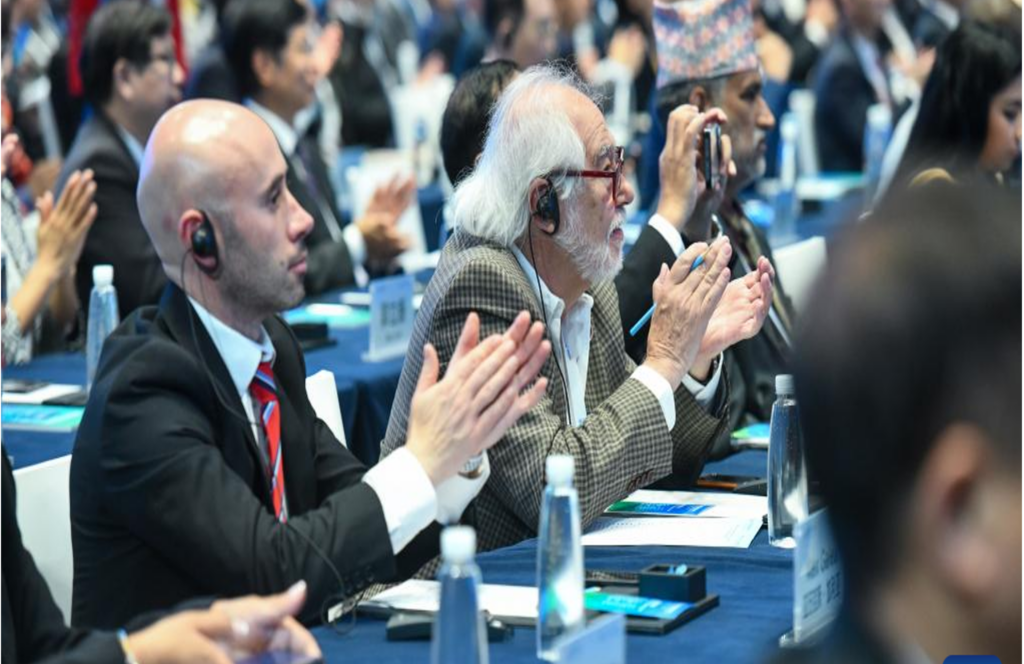
World Insights
Chinese modernisation is inspiring for the world, say participants at the World Media Summit. Participants at the fifth World Media Summit in the Chinese cities of Guangzhou and Kunming shared their insights about Chinese modernisation, saying it is inspiring for the world.
Participants noted that the summit allows them to personally experience China’s approach to modernisation, its people-centred philosophy and its emphasis on innovation.
To see is to believe
The participants from various regions, including the Middle East, Latin America, Africa, the Caribbean and Europe, agree that the best way to know China’s development is to “see with your own eyes.”
Mohamad Malli, press centre manager of the Lebanese Ministry of Information, said he used to know China from reading as a poor country with poverty-stricken people.” But when I come and see with my own eyes, I find you have clean and good nature, polite and educated people,” he said.
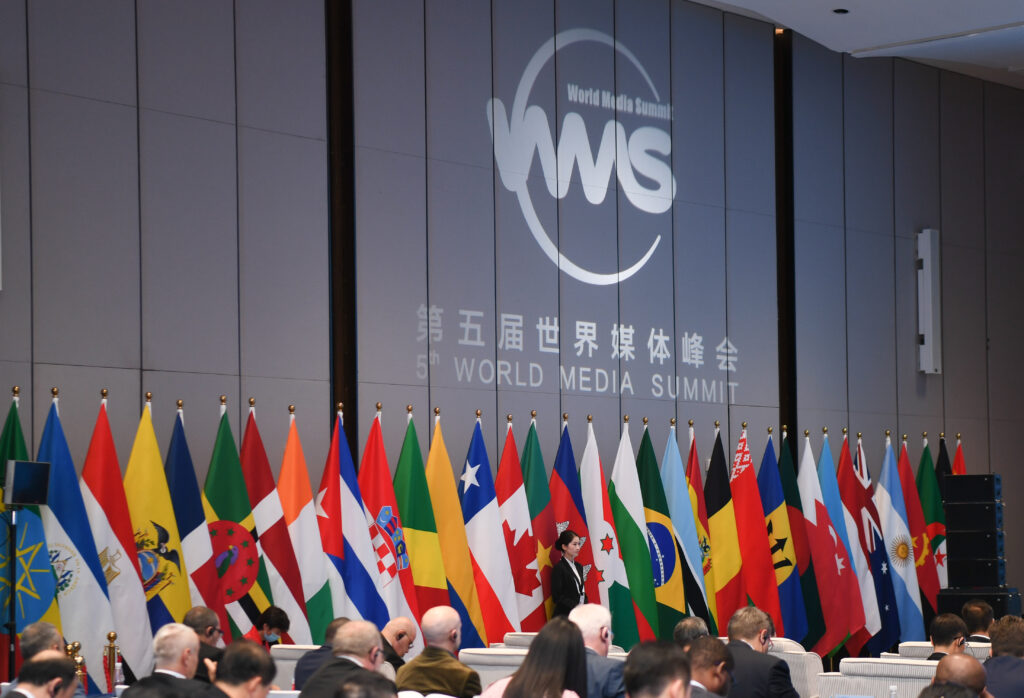
General manager of Grupo Multimedios (Mexico) Guillermo Franco Gallegos has a similar view, saying that people will know whether the China they watched on TV, read about in the newspaper, or heard about from others is true after seeing it by themselves.
“If I didn’t come here, I wouldn’t know that it is a great civilisation,” said Peter Tata Mabu, deputy managing editor of Cameroon News and Publishing Corporation.
Janna Tolstikova, CEO of TV BRICS, said, “This kind of event (the fifth World Media Summit) brings opportunities for participants to see with their own eyes what’s happening here.”
People Centred
A key hallmark of Chinese modernisation is its commitment to people-centred development, prioritising its citizens’ well-being, empowerment and quality of life.
“The key element of that modernisation in China is what can be referred to as a people-centred modernisation, people-centred development,” said Mark Levine, an American professor at the Minzu University of China.
The economy and societal development are essential, but it all starts with improving Chinese people’s lives and living conditions, Levine said.
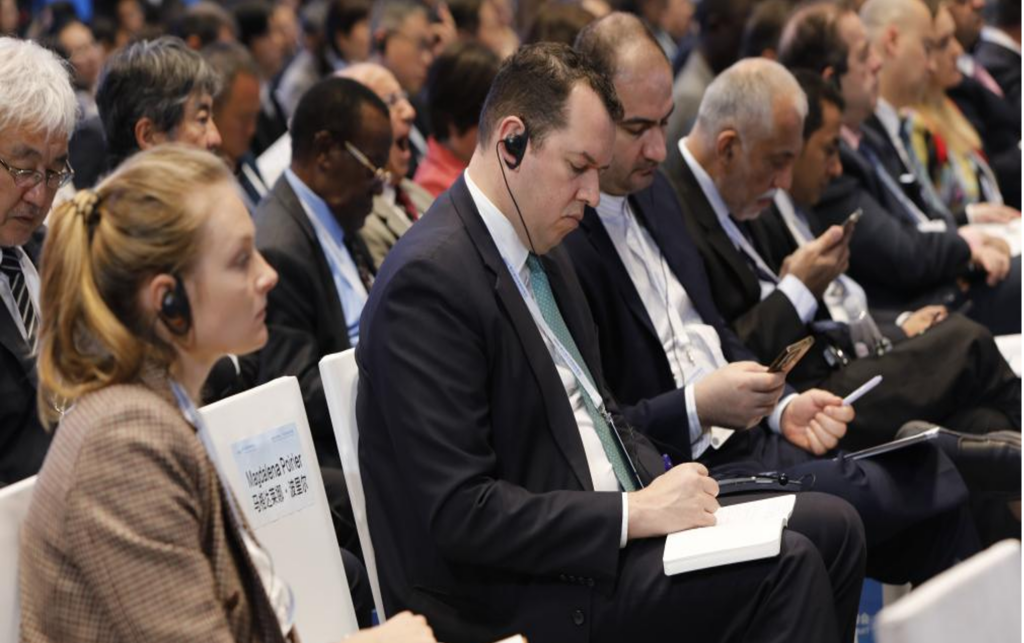
Martin Jacques, a renowned British scholar, said that China’s modernisation, which is people-oriented, “seeks to humanise modernity, to put people’s needs and interests before narrow material gain, to prioritise people’s spiritual needs above those of narrow consumerism.”
“The prosperity of a society is inseparable from the well-being of its people, which is the most crucial issue,” said Zafar Uddin Mahmood, president of the Understanding China Forum, a Pakistan-based think tank.
The fact that China has nearly lifted 800 million rural individuals out of poverty is the best proof of the people-centred philosophy of Chinese modernisation. And now, China is embarking on a new journey towards constructing a modern socialist country.
Innovation Driven
Citing the development of trains, construction, and autonomous vehicles, Chun Wai Wong, the Malaysian National News Agency chairman, said Chinese modernisation is advancing tremendously. “Every time I come to China, it’s an eye-opener for me,” he said.
China can modernise at such a fast pace because the country sticks to an innovation-driven strategy. The tour to Huawei village and Tencent headquarters on the sidelines of the summit organised by Xinhua News Agency left a profound impression on the participants.
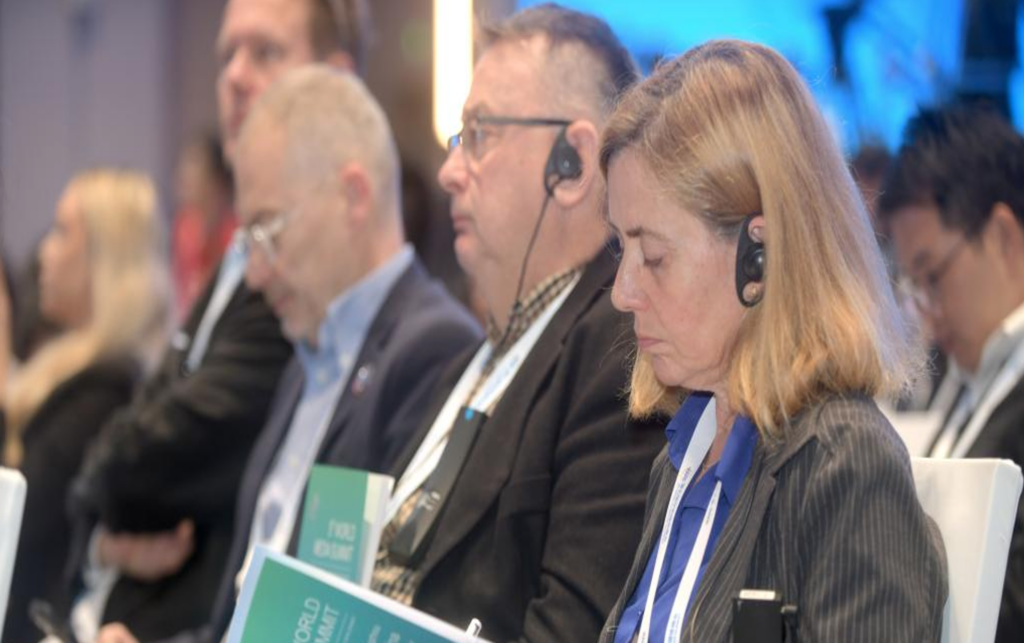
Jose Juan Sanchez, chief of Brazil’s financial and agricultural information provider CMA Group, said that he was deeply impressed by the rapid pace of China’s technological development and its substantial support for talent.
Echoing Sanchez, Khalid Mubarak SH S Al-Shafi, editor-in-chief of The Peninsula Newspaper, said, “This is my second visit to China. I am amazed by the technological advancement and significant development.”
“The world needs to know a real Africa and a real China and how they cooperated to benefit people on both sides. The China-Africa cooperation in various aspects has set a good example for the whole world, so as African media, we do have a story to tell,”
The WMS serves as an essential platform for African media outlets to interact with their counterparts across the globe.
It is of great importance that media outlets in China and the Arab world introduce each other objectively and impartially, while the Western media “mostly adopt biased and non-positive views on the Arab countries and China,” said Ahmed Sallam, former undersecretary of Egypt’s State Information Service.
Highlighting media’s increasingly significant role in building relationships between countries and fostering dialogue between states, the CEO of TV BRICS said, “It is the work of the media that allows us to ‘build bridges’ between countries and entire civilisations, to introduce them to each other, to unite and bring them together.”

A Malaysian observer has said that designed to harm China’s position on the global stage, the anti-China narrative peddled by the West to international audiences exposes the ignorance of those seeking to undermine the country’s peaceful rise. Unable to understand or accept China’s economic and social achievements in recent decades, the West, through its extensive media dominance, has turned to attacking China and its peaceful developments, Chandran Nair, founder and CEO of the Global Institute for Tomorrow, told Xinhua in an interview.
The idea that Western media are run by independent, impartial people who speak only truth to power is an illusion. We need more non-Western sources and readers who are more informed about global issues so they don’t fall prey to the current propaganda war,” Nair said.
Roy Lie-Atjam is a seasoned editor at Diplomat Magazine who has observed numerous technological advancements during his visit. Originally from the Netherlands, Lie-Atjam is confident that his readers’ opinions about China were flawed. He aims to give his readers a more precise portrayal of China by dispelling their previous misconceptions. (Shenzhen News Group)

